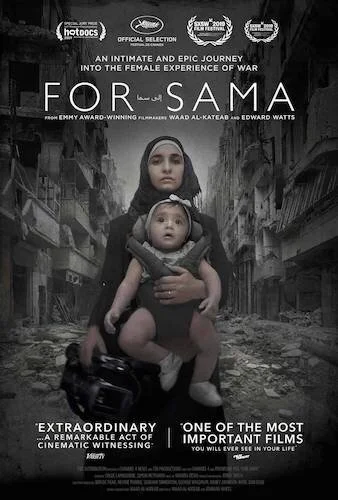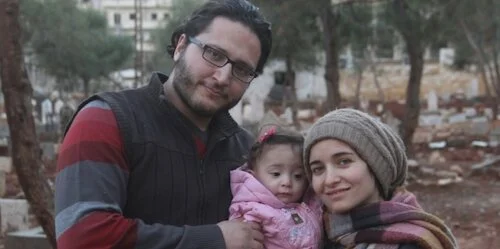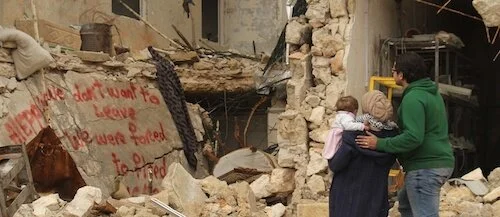For Sama
Please excuse our lateness of this review! We are covering every Academy Award nominee of 2020, so we’re cleaning up the films we forgot to critique earlier.
We mentioned a short while ago that Honeyland set a new record for being the only documentary and international film nominee at the Academy Awards to ever exist. What wasn’t brought up was For Sama, which was only nominated for Best Documentary Feature. However, it broke its own ground at the BAFTAs, where it dominated a total of four different categories, three of which are often non-documentary friendly in the slightest: Outstanding British Debut, British Film, and Best Film not in the English Language. PBS has spotlit this visual journal in its Frontline series, and it is free for all to see on their YouTube channel. It’s a brisk hour and twenty four minutes. From the very first minute, you can see where all of the BAFTA love came from.
Easily, For Sama is the documentary of the year. It feels criminal that such a breakthrough film is this easily accessible, with zero cost. In short, For Sama wasn’t really meant to be a documentary for the world to see at first. This was a series of recorded footage for a mother to send to her daughter if she was to ever wonder what happened to her parents when she was too young to remember. What started out as the taping of the Syrian uprising of 2011, began to turn into the documentation of the survival of a war torn civilization. A university campus is where filmmaker Waad al-Kateab (a pseudonym to cover her real identity) makes her initial claims. Buildings brought to ruins is where we end off, as al-Kateab wonders what to do now that her homeland is completely destroyed.
al-Kateab and her family, taking a family portrait in front of a ransacked landscape.
With the help of English filmmaker Edward Watts, al-Kateab was able to record all of her daily struggles. She is a journalist by trade, and her husband is a doctor committed to his work. When Aleppo changed into a completely different territory, their purposes as humans shifted too. Husband Hamza is now dedicated to taking care of victims of war, as corpses are raced into the operating room for Hamza and his team to revive them after countless bombings. It’s gotten bad enough that children know what specific types of explosives are carried out regularly. Waad is focused on using her camera to show the destruction of her city; again, this was meant to be a message to her daughter Sama if she didn’t live long enough, but now it’s a letter to the entire world.
For Sama is so effective, even if you know what is going to happen. We know Sama is alive, because we see current (or newer) footage of the daughter throughout the film. Yet, when we see a non-responsive Sama during her birth having to be brought back into a state of breathing, we are still brought to tears. Perhaps one of 2019’s most difficult scenes to witness, Sama’s determination is a cause to cheer as loudly as you can. The powerful filmmaking turns even the obvious into a harrowing minute where blinking will even disrupt your gaze, as you stare and hope everything will turn out okay.
Aleppo in ruins.
For Sama begins to turn into a test of “how much longer can this family cope under these conditions?”. The al-Kateabs want to help their fellow person, but they cannot take the daily traumatic bombings (that echo throughout the hospital they live in with ear shattering volume) or the heightened danger for much longer. Hospitals are being shut down or blown apart, and Hamza’s location is the only one left. It’s a sitting duck. For Sama was a message to a child from loving parents that thought they may never be able to talk to their offspring at some point in the near future. It becomes a quest: what can be done to protect Sama (and her sister that is on her way)? This journey — cut together like a living diary — is emotional beyond words. Since there is legally free access to For Sama through PBS, I cannot stress enough how much you owe it to yourself to witness this evidence of human survival in some of the world’s most horrific living conditions. Watch it for Sama, to understand the reality that millions of people have had to endure or flee from, and to see the fate that bold parents made sacrifices to protect their loved one from.
Andreas Babiolakis has a Masters degree in Film and Photography Preservation and Collections Management from Ryerson University, as well as a Bachelors degree in Cinema Studies from York University. His favourite times of year are the Criterion Collection flash sales and the annual Toronto International Film Festival.







